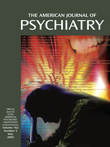To the Editor: Dr. Herrmann et al. reported a retrospective study concerning the risk of stroke among 11,400 patients (age >66 years) who were administered atypical antipsychotics. Use of atypical antipsychotics was not associated with an elevated risk of stroke compared with use of conventional neuroleptics.
We examined the 2-year risk of death among dementia patients who were using atypical antipsychotics or conventional neuroleptics or were nonusers. Originally, 425 patients (age >69 years) in city hospitals and nursing homes in Helsinki, Finland, participated
(1); 255 had dementia and 106 had delirium, according to DSM-IV criteria.
One hundred thirty-five (52.9%) of 255 patients were given antipsychotics at baseline, 40.4% took conventional neuroleptics, and 12.5% took atypical antipsychotics. After 2 years, 118 of 255 were deceased. The death rate was 47.6% among those taking conventional antipsychotics, 21.9% among those taking atypical antipsychotics, and 50.0% among nonusers. We performed a logistic regression analysis to clarify which factors had independent prognostic value in mortality. When we entered age, gender, severe stage of dementia (clinical dementia rating=2–3), delirium, high number of comorbidities, impaired physical functioning, use of neuroleptics, use of atypical antipsychotics, and use of restraints into the model, only old age (>85 years) (odds ratio=1.71, 95% confidence interval [CI]=1.00–2.95), high number of comorbid disorders (odds ratio=1.96, 95% CI=1.03–3.73), and use of restraints (odds ratio=2.45, 95% CI=1.06–5.65) predicted mortality. It is surprising that the use of atypical antipsychotics seemed to protect against death (odds ratio=0.40, 95% CI=0.17–0.96). Conventional neuroleptics did not have any effect.
There is a concern that atypical antipsychotics increase the risk of stroke among dementia patients. In the study by Dr. Herrmann et al., there was no evidence of that. Nevertheless, the study also consisted of people without dementia. Patients with dementia are often old and frail and have comorbidities and delirious episodes with acute illnesses that possibly explain the high risk of death. They also have behavioral symptoms that are frightening for the patient and caregiver. These symptoms are the most common reason for admittance to permanent institutional care
(1). Thus, these patients urgently need control for their symptoms. There are several randomized trials showing that both atypical antipsychotics and cholinesterase inhibitors are efficient in controlling these symptoms
(1). The use of the cholinesterase inhibitors was quite rare—only 3%—among our participants in 1999–2000. Most patients used conventional neuroleptics. To our knowledge, there are no studies concerning the risk of taking neuroleptics among dementia patients. Our study presents that possibility.
It is possible that in our group the frailest patients were administered neuroleptics and the fittest were given atypical antipsychotics even though it would be against any recommendations. Nevertheless, our logistic regression analysis took into account comorbidities, physical functioning, age, and stage of dementia. Rather than showing an elevated risk, atypical antipsychotics had a protective effect.

